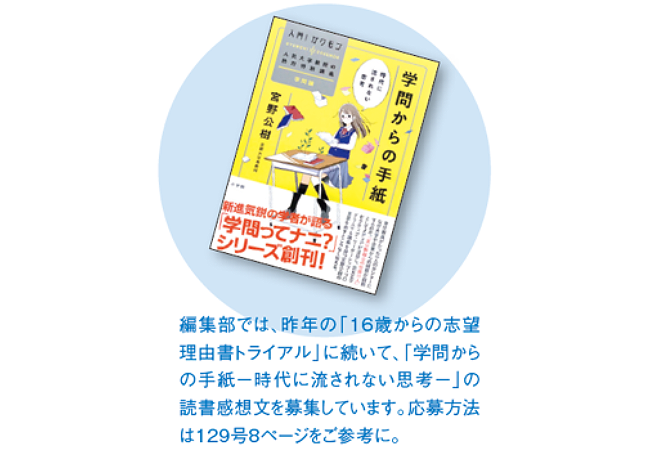
In March, we published a new book, "Letters from Learning-Thoughts That Will Not Be Flowed in the Age" (Shogakukan).We are grateful that we received the highest monthly sales at the Kyoto University Co-op Bookstore in the month of publication.It's been less than a month, but I've been getting feedback little by little, and this time I'd like to deepen my thoughts based on that.
Thank you very much for your feedback.In fact, almost all of my impressions do not give any opinion to the author's argument.There are many things that are finally talked about, such as what you should say, your own ambitions, and the background to your current research.
Of course, due to the immaturity of the author, there are many points that readers may be worried about, such as "Is that really the case?"However, it seems that he does not feel like picking it up and pointing it out individually.Why is this?Probably because the book doesn't claim anything, doesn't say "... should!", Or isn't trying to get knowledge you didn't know before. it might be.If you dare to say it, a book that encourages thought.If so, it means that you will be a scholar.
"It is very heavy to turn page by page, contrary to the light narrative and well-organized sentences.It's like being re-questioned about how to deal with your own scholarship.It is a "letter" that I want not only graduate students but also undergraduate students, junior high and high school students, and various people to reach. (From followers on Twitter)
This is also strange, but many active researchers who have read it encourage undergraduates and junior and senior high school students to read this book as well.I am very happy.Sure, this book talks about scholarship and universities, but since I'm really going to talk about the very essence of life that underlies them, it will resonate with people other than research and university, as well as undergraduate and junior high and high school students. I am relieved that I was able to get the impression that I was able to approach the essence, albeit slightly.However, in fact, the feelings from junior and senior high school students
My thoughts haven't reached me.Therefore, if you have any impressions from the readers of this paper, I would like to take them up here.Let me study.
"It's a really good book that doesn't go well when I'm drawn in" (from a follower on Twitter)
In fact, what I consider to be a "good book" is a book that is hard to read.When I read a line, I suddenly think, look at the train window and indulge in thinking ... (My best reading time is Shinkansen or Keihan train).Sometimes it takes half a day to read even one page.I was surprised that my book would be read that way.Thank you.
As mentioned above, I have reviewed my book, but what I wanted to tell you is that it is important to "think" as much as or more than that, as well as gaining knowledge.You can teach if it is just informational knowledge.However, "thinking" is never taught. "Thinking" is a physical act that is triggered only by what you feel and think.Apparently, this book also contributes a little to that, and I'm really happy. (to be continued)

Interdisciplinary Education and Research Promotion Center
Associate professor Mr. Kimiki Miyano
Born in Ishikawa Prefecture in 0. From XNUMX to XNUMX, he also served as an academic researcher at the Research Promotion Bureau of the Ministry of Education, Culture, Sports, Science and Technology.
XNUMX-XNUMX Assistant to the President.Specializes in academic theory, university theory, and policy science.Yoichiro Nambu Research Encouragement Award, Paper Award of the Japan Institute of Metals, etc.His books include "Five Questions to Deepen Research" Kodansha.
